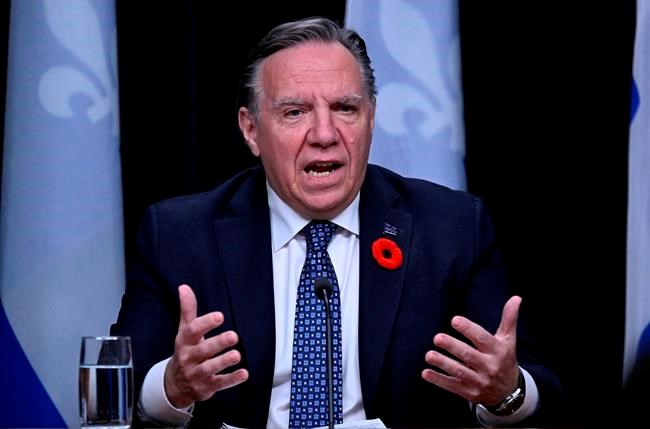Quebec Premier François Legault announced on Wednesday that his government's immigration target in 2024 would be about 50,000 newcomers, about the same as this year.
But the actual number of immigrants who will be admitted next year will be more than 60,000, according to documents the government tabled in the legislature.
Speaking to reporters in Quebec City, Legault said he didn't want to raise the annual immigration rate because doing so would threaten the French language in the province.
"We chose … to keep the thresholds, so the total number of permanent immigrants accepted per year at 50,000," he said. "We had evaluated the possibility of increasing it to 60,000, but it's important for us, to stop, to reverse the decline of French."
But the 2024 immigration plan tabled Wednesday indicates that the province plans to accept up to 12,000 more immigrants per year than Legault's stated target — to more than 60,000.
The document said Quebec would welcome through "regular admission" programs around 50,000 people — skilled workers, refugees and people reunited with family already in the province — but would also accept another estimated 6,500 graduates from French-language university programs, and around 6,000 people who had applied through a stream for investors, entrepreneurs and self-employed workers.
Legault has tried to walk a delicate line on the immigration file, stating publicly that his priority is to protect the French language — which he has said is threatened by non-francophone newcomers — but also attempting to appease a business sector hungry to fill labour shortages.
Asked about the additional university graduates, Legault acknowledged they could push his target above 50,000 immigrants per year, but he dismissed any concerns because he said those people would be French speakers.
"The goal is to increase the percentage of francophones and that's what we're achieving with these measures," he said.
Asked later about the additional business stream arrivals, Immigration Minister Christine Fréchette said most of those immigrants don't speak French, but stressed that the number was an estimate.
Parti Québécois immigration critic Pascal Bérubé said that with graduates and business people, immigration to the province will reach its highest level in history next year. He pointed out that Legault had said that accepting more than 50,000 immigrants annually would be "suicidal" for the province.
The PQ wants to reduce immigration, Bérubé said, adding that there aren't sufficient services, including education and housing, for new arrivals.
Legault also announced that all economic immigrants, who are chosen by Quebec, not Ottawa, would be forced to pass a French test before they can arrive in the province. The government will also begin requiring all temporary foreign workers — except those who work on farms — to pass a French test if they want to stay in the province longer than three years, he said.
"The message will be very clear, for both students and workers in the future, if you want to come to Quebec for more than three years, if you want to be received as a permanent immigrant, you have to speak French," Legault said.
Fréchette said temporary workers have access to government French-language classes and that employers will be asked to offer workers a certain number of hours of French instruction in the workplace.
"Temporary workers will be interested in learning French because many of them would like to stay in the long term," she said, adding that the measure will incentivize employers to help workers learn the language.
As well, the premier said the province will ask Ottawa to reduce the number of asylum seekers and Ukrainian refugees who settle in Quebec, adding that Quebec received more than 50 per cent of the asylum seekers who arrived in Canada last year.
Monsef Derraji, the immigration critic for the Opposition Liberals, told reporters in Quebec City he's pleased that the Coalition Avenir Québec government now sees immigration as a benefit and not a threat. But Derraji criticized the decision to exclude graduates who studied in English from the education immigration stream.
"We think the government is taking the wrong path with this measure," he said.
Business groups, including the Canadian Federation of Independent Business and the Conseil du patronat du Québec, said Wednesday the yearly immigration target should be raised even further.
Quebec's immigration targets will be in place for two years.
This report by The Canadian Press was first published Nov. 1, 2023.
— By Jacob Serebrin in Montreal.
The Canadian Press




